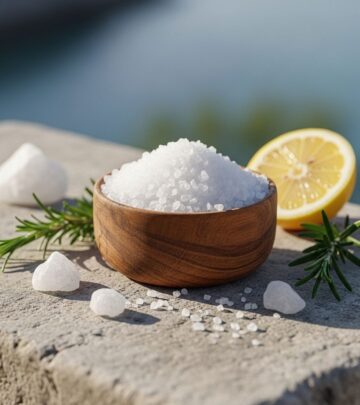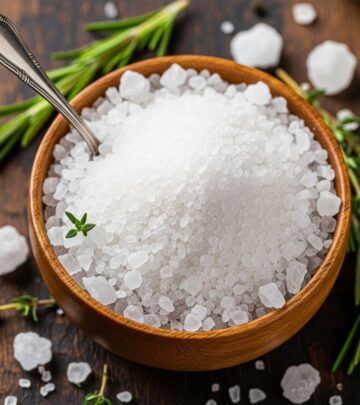Lemongrass Tea: Benefits, Uses, Side Effects, and FAQs
Experience a gentle ritual that promotes digestion, calm, and natural detoxification.

Lemongrass tea is a fragrant herbal brew made from the stalks and leaves of the lemongrass plant (Cymbopogon citratus). Widely favored in various cultures for its fresh citrus aroma and flavor, it is celebrated in traditional medicine for a range of health-promoting properties. Over recent years, modern research has begun to validate several of lemongrass tea’s traditional uses, highlighting its potential as a natural remedy for numerous health concerns.
What Is Lemongrass?
Lemongrass is a tall, perennial grass native to tropical climates in Asia, Africa, and Australia. It is well known in culinary circles—especially in Southeast Asian cuisine—but is also a staple herb in Ayurvedic and folk medicine practices. The herb is sometimes referred to as citronella and is prized for its distinctive lemony scent and subtle, sweet flavor.
Nutrition Profile of Lemongrass
Lemongrass contains a variety of beneficial plant compounds, including flavonoids and phenolic compounds such as:
- Citral – provides the citrus aroma and has antioxidant properties
- Myrcene
- Limonene
- Geraniol
- Chlorogenic acid
- Isoorientin
- Swertiajaponin
It is also a source of small amounts of micronutrients such as vitamins A and C, folate, potassium, magnesium, calcium, and iron. These natural chemicals contribute to many of its touted health effects.
Top Science-Backed Health Benefits of Lemongrass Tea
Lemongrass tea is used around the world as a traditional remedy for ailments ranging from digestive issues to high blood pressure. Recent research has shed light on its efficacy and the mechanisms behind its perceived benefits.
1. Antioxidant Properties
Lemongrass is rich in antioxidants including chlorogenic acid, isoorientin, and swertiajaponin, which help combat oxidative stress in the body. These compounds protect cells from free radical damage, which is linked to aging and chronic diseases such as heart disease and cancer.
2. Anti-Inflammatory Effects
Lemongrass tea contains compounds with potent anti-inflammatory effects, such as citral and limonene. These may help reduce tissue inflammation and are being studied for their relevance in the management of conditions like arthritis and inflammatory bowel disease.
3. Antimicrobial Activity
Lemongrass tea exhibits antimicrobial properties, capable of fighting certain bacteria and fungi. Studies show lemongrass can inhibit pathogens such as Staphylococcus aureus, Escherichia coli, and Candida albicans. This makes it beneficial for supporting a healthy immune system and preventing infections.
4. Potential Anticancer Benefits
Laboratory research suggests lemongrass may have anticancer properties thanks to its high antioxidant content and compounds like citral. Early evidence indicates it might slow the growth of certain cancer cells, though much more study in humans is needed.
5. Improves Sleep and Promotes Relaxation
Lemongrass tea has been used as a folk remedy for improving sleep quality and reducing stress. It is thought to have mild sedative effects, helping to calm the mind and body and making it a popular choice before bed.
6. Promotes Digestive Health
Lemongrass tea is valued as a traditional digestive aid, reputed to relieve symptoms of:
- Stomach cramps
- Indigestion
- Bloating and gas
- Constipation
- Nausea
Animal studies indicate that lemongrass oil can help protect the stomach lining from damage caused by irritants like aspirin.
7. Natural Diuretic Actions
Lemongrass tea is a known diuretic, increasing urine output and helping to expel excess fluid and sodium from the body. Diuretics are useful for managing fluid retention (edema), heart failure, and liver conditions. Human studies found lemongrass tea led to significantly higher urine output compared to control beverages.
8. May Help Lower Blood Pressure
Several studies have found that lemongrass tea can help reduce systolic and diastolic blood pressure, possibly by promoting vasodilation and decreasing peripheral vascular resistance. Short-term consumption appears effective, though long-term effects may be less pronounced for some individuals.
Key findings from studies:
- Short-term drops in both systolic and diastolic blood pressure after drinking lemongrass tea
- Increase in heart rate and diuresis, especially at higher doses
- Effects tend to diminish over long-term use except at the highest doses
| Parameter | Short-Term Effect | Long-Term Effect |
|---|---|---|
| Systolic Pressure | Moderate decrease | Decreased only at highest dose |
| Diastolic Pressure | Marked decrease | Returns to baseline |
| Heart Rate | Increased | Returns to baseline |
Caution: People with certain heart conditions should use lemongrass carefully due to these effects on blood pressure and heart rate.
9. Supports Healthy Cholesterol Levels
Research suggests lemongrass tea may help reduce total cholesterol and low-density lipoprotein (LDL) cholesterol, especially in animal and in vitro studies. A study on rats showed significant decreases in cholesterol after consuming lemongrass extract, and test tube studies found it may block cholesterol absorption in the gut. More research is needed to confirm these benefits in humans.
10. May Support Anemia Prevention
Lemongrass tea contains iron and other compounds that may stimulate the production of red blood cells. In a human study, regular consumption led to significant increases in hemoglobin, packed cell volume (PCV), and RBC count, suggesting a potential helping role in preventing or managing anemia. White blood cell counts changed in a manner consistent with improved immune health.
11. Potential Aid in Weight Loss
Lemongrass tea is valued as a detox tea and may help with weight loss efforts, primarily through its diuretic effects and as a calorie-free alternative to sugared drinks. While direct scientific evidence is limited, many report anecdotal benefits such as feeling lighter and experiencing reduced bloating.
12. Alleviates Menstrual Discomfort and PMS
Some women use lemongrass tea as a natural remedy for cramps, bloating, and irritability related to menstruation. Its gentle muscle-relaxant and anti-inflammatory effects may help ease period pain and improve mood.
13. Supports Immune Function
Lemongrass contains vitamin C, antioxidants, and antimicrobial compounds that help the body fight infections and support immune health, reducing the risk of common colds and other ailments.
Traditional and Household Uses of Lemongrass Tea
Beyond its health benefits, lemongrass is widely known for its culinary and household applications:
- Flavoring ingredient for soups, curries, and teas, especially in Thai and Vietnamese cuisine
- Aromatherapy and essential oil for stress relief
- Natural mosquito and insect repellent
- Skincare and hair care ingredients
How to Make Lemongrass Tea at Home
Brewing fresh lemongrass tea is simple and rewarding. Follow these steps:
- Chop 2–3 stalks of fresh lemongrass, discarding tough outer leaves
- Crush stalks slightly to release essential oils
- Boil in 2–3 cups of water for 5–10 minutes
- Strain and serve hot or iced, optionally adding honey or lemon for taste
Dried or prepackaged lemongrass tea bags are also available for convenience.
Possible Side Effects and Precautions
Lemongrass tea is generally safe for most people when consumed in moderation as part of a balanced diet. However, potential side effects and risks include:
- Allergic reactions in some individuals (skin rashes, itching, swelling)
- Risk of dizziness or excessive diuresis if consumed in large amounts
- Interactions with diuretics or blood pressure medications
- Potential uterine stimulation—consult a doctor before use during pregnancy
- Possible drops in blood sugar or heart rate in sensitive individuals
Always consult your healthcare provider before starting any new herbal supplement, especially if you are pregnant, breastfeeding, taking medications, or have chronic health conditions.
Frequently Asked Questions (FAQs) about Lemongrass Tea
Q1: Can you drink lemongrass tea every day?
A: Drinking one to two cups daily is generally considered safe for most healthy adults. However, excessive consumption may lead to unwanted effects such as overhydration or imbalance in electrolytes due to its diuretic action.
Q2: Is lemongrass tea safe during pregnancy?
A: Pregnant women should exercise caution with lemongrass tea, as it may stimulate uterine contractions. Always consult your healthcare provider before consumption during pregnancy.
Q3: Does lemongrass tea contain caffeine?
A: No, lemongrass tea is naturally caffeine-free, making it an excellent beverage for relaxation or for those avoiding caffeine.
Q4: Can lemongrass tea help with anxiety or stress?
A: Lemongrass tea is traditionally used as a calming herbal tea, and its scent and compounds may promote relaxation and reduce mild anxiety, though more research is needed.
Q5: Does lemongrass tea interact with medications?
A: Lemongrass tea may enhance the effects of diuretics and antihypertensive medications. Consult your doctor if you are taking such drugs or if you have chronic health conditions.
The Takeaway
Lemongrass tea offers a wealth of potential health benefits, including antioxidant protection, enhanced digestion, reduced blood pressure, cholesterol management, weight loss support, and immune boosts—all in a caffeine-free package. While generally safe in moderation, it should be consumed cautiously by those with health issues or who are pregnant. Savor it as part of a healthy, varied diet and consult with a healthcare professional for personalized advice.
References
- https://pmc.ncbi.nlm.nih.gov/articles/PMC9598547/
- https://www.healthline.com/health/food-nutrition/lemongrass-tea
- https://pubmed.ncbi.nlm.nih.gov/25162916/
- https://www.webmd.com/diet/lemongrass-health-benefits
- https://www.mskcc.org/pdf/cancer-care/patient-education/herbs/lemongrass
- https://www.siloamhospitals.com/en/informasi-siloam/artikel/the-health-benefits-of-lemongrass-a-medical-perspective
Read full bio of medha deb












